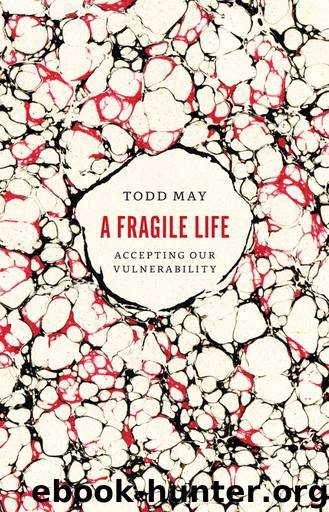A Fragile Life by Todd May

Author:Todd May [May, Todd]
Language: eng
Format: epub
ISBN: 978--0-226-44001--9
Publisher: University of Chicago Press
Published: 2017-02-01T16:00:00+00:00
[ 4 ]
From Affirmation to Acceptance
Sometimes in philosophy we can gain perspective by wrestling with a single example. Seeing how someone views this example, engaging with their view, and drawing our own conclusions allows us to open perspectives that might otherwise be closed to us. In most of this chapter we will be doing precisely that. The example we will wrestle with is one we’ve seen in passing already: the bourgeois professor mentioned in the second chapter. Offered by the philosopher R. Jay Wallace, this example, to his mind, points in a direction almost opposite of that of invulnerabilism. It points to a necessary pessimism about our lives.
If we reflect on Wallace’s example, and the perspective through which Wallace sees it, I believe we can move past both the pessimism of his view and the invulnerabilism of the last chapter toward a more balanced and more attractive way of thinking about our relation to suffering. That way can be crystallized in a single word: acceptance. But to see what acceptance is in this particular sense requires us to frame an entire perspective, one that I think will feel at once familiar and novel. We will slowly work our way to that perspective in this chapter and then unfold it in the next.
For Wallace, there are aspects of our lives that we cannot help affirming but that we know we should reject. In The View from Here: On Affirmation, Attachment, and the Limits of Regret, Wallace argues for what he calls a “modest nihilism.”1 This nihilism stems from the fact that we—or at least many of us—live in ways that force us to affirm aspects of our lives that we know to be morally compromised. The reason for this, broadly speaking, is that in becoming the particular people we are in the ways that we value most, we do so on the basis of a past that is morally flawed, often deeply so.
We should clarify for ourselves what Wallace means by affirmation. He posits what he calls an “affirmation dynamic” that characterizes our relation to important (or, as we will see, perhaps all) aspects of our past. He writes, in a passage that perhaps illustrates why more people don’t read philosophy, “If we are attached to an individual or a project, then we will typically affirm the direct objects of our affirmation in a distinctively unconditional way; this in turn commits us to affirming their necessary constitutive and historical and normative conditions in a way that is similarly unconditional, and precludes our regretting that those conditions obtained. We might refer to this as the dynamic of unconditional affirmation (or the ‘affirmation dynamic’ in short).”2
What does he mean here? The affirmation dynamic arises in regard to something that is important to us, be it a person, an object, or a personal commitment. In affirming the existence of that person, object, or personal commitment, we cannot simply affirm its existence separate from everything else that has happened to us or that we have done.
Download
This site does not store any files on its server. We only index and link to content provided by other sites. Please contact the content providers to delete copyright contents if any and email us, we'll remove relevant links or contents immediately.
The remains of the day by Kazuo Ishiguro(8999)
Tools of Titans by Timothy Ferriss(8396)
Giovanni's Room by James Baldwin(7346)
The Black Swan by Nassim Nicholas Taleb(7129)
Inner Engineering: A Yogi's Guide to Joy by Sadhguru(6796)
The Way of Zen by Alan W. Watts(6614)
The Power of Now: A Guide to Spiritual Enlightenment by Eckhart Tolle(5781)
Asking the Right Questions: A Guide to Critical Thinking by M. Neil Browne & Stuart M. Keeley(5775)
The Six Wives Of Henry VIII (WOMEN IN HISTORY) by Fraser Antonia(5515)
Astrophysics for People in a Hurry by Neil DeGrasse Tyson(5190)
Housekeeping by Marilynne Robinson(4447)
12 Rules for Life by Jordan B. Peterson(4304)
Ikigai by Héctor García & Francesc Miralles(4274)
Double Down (Diary of a Wimpy Kid Book 11) by Jeff Kinney(4272)
The Ethical Slut by Janet W. Hardy(4253)
Skin in the Game by Nassim Nicholas Taleb(4248)
The Art of Happiness by The Dalai Lama(4130)
Skin in the Game: Hidden Asymmetries in Daily Life by Nassim Nicholas Taleb(4007)
Walking by Henry David Thoreau(3962)
